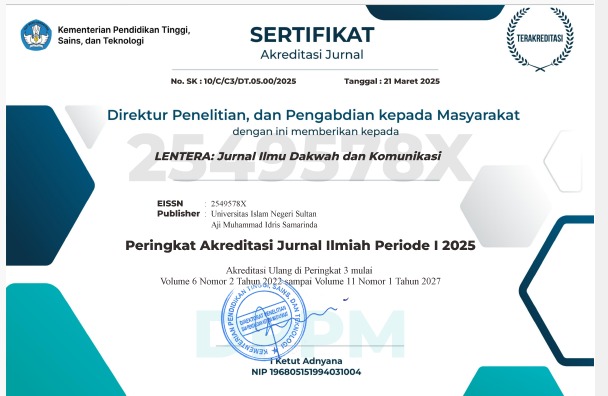K-drama Binge Watching among College Students: Motives, Patterns and Implications
Abstract
The binge-watching phenomenon has become a trend when one of the online streaming television platforms, Netflix, offers a variety of series genres. The phenomenon of binge-watching has become a common practice among spectators and students are one of them and binge-watching activities are part of student activities in their daily lives. This study aims to describe the motives, patterns and implications of binge-watching through descriptive qualitative approach using interview in obtaining primary data with 20 college students as informants. The results of the study found that there are (1) the motivation of students to binge-watch is to spend time, entertain, escape, and relax (2) the implications of watching marathons are in the form of physiological and social implications.
References
Castro, D., Rigby, J. M., Cabral, D., & Nisi, V. (2021). The binge-watcher’s journey: Investigating motivations, contexts, and affective states surrounding Netflix viewing. Convergence, 27(1), 3–20. https://doi.org/10.1177/1354856519890856
Creswell, J. W. (2014). Research design: Qualtative, quantitative and mixed method approaches. Sage Publications, Inc.
Flayelle, M., Maurage, P., & Billieux, J. (2017). Toward a qualitative understanding of binge-watching behaviors: A focus group approach. Journal of Behavioral Addictions, 6(4), 457–471. https://doi.org/10.1556/2006.6.2017.060
Jenner, M. (2016). It this on TVIV? On Netflix, TVIII and binge-watching. Media and Society, 18(2), 257–273. https://doi.org/http://dx.doi.org/10.1177/1461444814541523
Morissan, Wardhani, A. C., & Umarella, F. H. (2012). Metode penelitian survey. Kencana Prenada Media Group.
Muhammad, M. (2016). Pengaruh motivasi dalam pembelajaran. Lantanida Journal, 4(2), 87–97. https://doi.org/http://dx.doi.org/10.22373/lj.v4i2.1881
Nafida, F. (2021). Pengaruh drama korea di media tv terhadap perilaku mahasiswa IISIP Yapis Biak. Copi Susu: Jurnal Komunikasi, Politik & Sosiologi, 3(2), 10–16. https://www.iyb.ac.id/jurnal/index.php/copisusu/article/view/185
Nawawi, M. I., Anisa, N., Syah, N. M., Risqul, M., Azisah, A., & Hidayat, T. (2021). Pengaruh Tayangan K-Drama (Korean Drama) terhadap Motivasi Belajar. Edukatif : Jurnal Ilmu Pendidikan, 3(6), 4439–4447. https://doi.org/10.31004/edukatif.v3i6.1201
Panda, S., & Pandey, S. C. (2017). Binge watching and college students: Motivations and outcomes. Young Consumers, 18(4), 425–438. https://doi.org/10.1108/YC-07-2017-00707
Perks, L., Steiner, E., Pierce-Grove, R., & Mikos, L. (2021). Binge-Watching Audience Typologies: Conclusion. Binge-Watching and Contemporary Television Studies, 131–142. https://doi.org/10.3366/edinburgh/9781474461986.003.0009
Roy, R. D., & Mathias, P. M. (2022). Binge-Watching And Its Impact On The Academic Performance Of College Students. Journal of Positive School Psychology, 2022(10), 2975–2990. http://journalppw.com
Steiner, E., & Xu, K. (2020). Binge-watching motivates change: Uses and gratifications of streaming video viewers challenge traditional TV research. Convergence, 26(1), 82–101. https://doi.org/10.1177/1354856517750365
Subagja, E. A., Wahyunengsih, & Farhanah, K. (2021). Analysis of the psychological impact on the high intensity of watching korean dramas on responsibilities as a student. Al-Irsyad: Jurnal Bimbingan Konseling Islam, 3(1), 51–64. http://jurnal.iain-padangsidimpuan.ac.id/index.php/Irsyad/article/view/5455/4001
Sung, Y. H., Kang, E. Y., & Lee, W.-N. (2018). Why do we indulge? Exploring motivations for binge watching. Journal of Broadcasting & Electronic Media, 62(3), 408–426. https://doi.org/10.1080/08838151.2018.1451851
Thomas, P. E. (2022). Exploring the Relationship between Binge Watching, Narrative Transportation and the Affective Responses-A Literature Review. IIS Univ.J.A, 11(1), 303–316.
Copyright (c) 2025 Lentera: Jurnal Ilmu Dakwah dan Komunikasi

This work is licensed under a Creative Commons Attribution-ShareAlike 4.0 International License.
Penulis yang menerbitkan artikel di Lentera: Jurnal Ilmu Dakwah dan Komunikasi setuju dengan ketentuan berikut:
- Penulis memiliki hak cipta artikel dan memberikan hak jurnal untuk publikasi pertama dengan karya yang secara simultan dilisensikan di bawah CC-BY-SA atau The Creative Commons Attribution – ShareAlike Licence.
- Penulis dapat membuat perjanjian kontrak tambahan yang terpisah untuk distribusi non-eksklusif versi jurnal yang diterbitkan dari karya tersebut (misalnya, mempostingnya ke repositori institusional atau menerbitkannya dalam sebuah buku), dengan pengakuan atas publikasi awalnya di jurnal ini.
- Penulis diizinkan dan didorong untuk memposting pekerjaan mereka secara online (misalnya, dalam repositori institusional atau di situs web mereka) sebelum dan selama proses pengajuan, karena dapat menyebabkan pertukaran yang produktif, serta kutipan yang lebih awal dan lebih besar dari karya yang diterbitkan (Lihat The Effect of Open Access)
Authors who publish articles in Lentera: Jurnal Ilmu Dakwah dan Komunikasi agree to the following terms:
- Authors retain copyright of the article and grant the journal right of first publication with the work simultaneously licensed under a CC-BY-SA or The Creative Commons Attribution–ShareAlike License.
- Authors are able to enter into separate, additional contractual arrangements for the non-exclusive distribution of the journal's published version of the work (e.g., post it to an institutional repository or publish it in a book), with an acknowledgment of its initial publication in this journal.
- Authors are permitted and encouraged to post their work online (e.g., in institutional repositories or on their website) prior to and during the submission process, as it can lead to productive exchanges, as well as earlier and greater citation of published work (See The Effect of Open Access).












.png)
